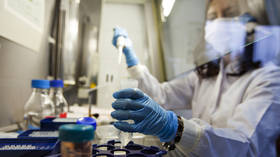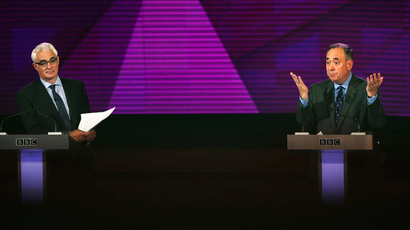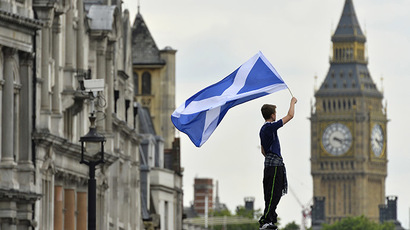Scottish independence: Sterling pounded on back of ‘yes’ surge
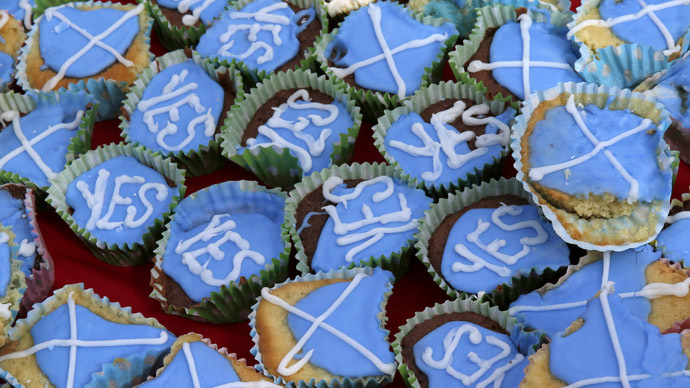
Surging support for Scottish independence saw the pound fall to a 10-month low. The head of the ‘Better Together’ campaign, however, denies panic among the ranks despite a plan to grant Scotland more powers if Scots reject independence.
The latest opinion poll, conducted by YouGov and the Sunday Times, put the pro-independence movement in the lead for
The FTSE 100 is a share index of the UK’s 100 biggest companies listed on the London Stock Exchange.The index began in 1984 at the base level of 1000. The highest value reached to date is 6950.6, on 30 December 1999. After falling during the financial crisis of 2007-2010 to below 3500 in March 2009, the index recovered to a peak of 6091.33 on 8 February 2011.It reached 6894 at the market close on 14 May 2014, its highest close since 1999.
the first time, with 51 percent voicing their support.
Reacting to the news, the British currency dropped 1 percent to $1.61 on the pound and almost 1 percent to 1.25 euro on the pound, its lowest level since November 2013.
Jitters also flooded through the stock market, as shares in companies with large Scottish interest suffered sharp falls.
Royal Bank of Scotland was hit hardest, down more than 3 percent in early trading.
Scottish & Southern Electricity fell 2.5 percent, Lloyds Banking Group dropped 2.2 percent, Standard Life was down 2 percent and Aberdeen Asset Management fell 1.5 percent. The FTSE 100 index – composed of the 100 largest companies listed on the London Stock Exchange (LSE), had reached a 14 year high. On Monday, however, it was down 18 points, at 6837.
Economists have pressured Prime Minister David Cameron to confirm the UK's stance on the status of sterling and the splitting of debt with Scotland in order to minimize risks of market instability and a run on the pound if independence is won.
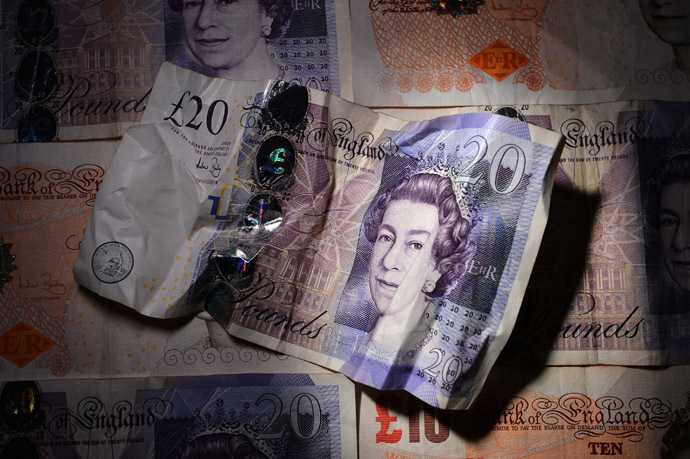
Michael Hewson of CMC Markets told the Guardian the pound could slide further on markets if Scotland votes for independence.
“One thing is certain, if we get this sort of volatility on the prospect of a yes vote, can you imagine the reaction if we do get a ‘yes’ vote? It's not likely to be pretty,” he said.
On Sunday, Chancellor George Osborne said a “plan of action” would be set out this week to offer “more powers to Scotland; more tax powers, more spending powers, more powers over the welfare state” if Scots reject independence in the September 18 referendum.
The Scottish National Party (SNP) dismissed the proposal as a last-minute “bribe.”
Speaking on BBC Radio 4 on Monday, ‘Better Together’ chairman Alistair Darling acknowledged the referendum race was “clearly very tight,” but denied the government’s proposals were a “panic” response.
“We are in a position now where every voter in Scotland could potentially tip the balance in the referendum,” said Darling.
“But I am confident we will win because we do have a very strong, positive vision of what Scotland can be, both in terms of the opportunities and the security that come from being part of the UK, a strengthened Scottish Parliament, with more powers which is what people want and you can do that without having to break up the country to do it.”
While no new powers will be announced this week, Darling said the government would be offering a solid timetable of reform to tempt Scots to stay.
“The additional powers coming to the Scottish parliament were announced by the party leaders, north and south of the border, some time ago,” he said.
“People have said, ‘Yes we want to know the timetable and the process,’ and that is something the government is going to announce this week.
“But remember this: this is a referendum on whether or not we stay on the United Kingdom. It is not a referendum on what further powers we are going to get. We are going to get them anyway, if we stay in the United Kingdom.”
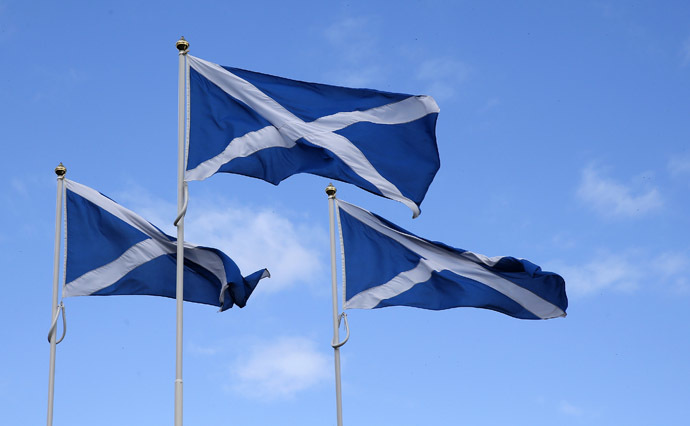
Previously, the Better Together campaign had enjoyed a consistent lead in the polls. Only a month ago, the lead was 22 percent in a YouGov poll. On Tuesday, the lead narrowed to 6 percent.
Despite the significant boost the poll has offered supporters of independence, ‘Yes’ camp leader Blair Jenkins said his side must remain focused, stating that the latest YouGov poll puts them “marginally ahead,” but other polls demonstrate there is “more progress to make if we are to win.”
On September 15, Cameron will give a final speech, urging the Scots to stay within the UK and have “the best of both worlds.” He has rejected claims he could be forced to stand down as PM if Scots vote for a split.
Cameron’s Conservatives are unpopular in Scotland, with only one MP in the House of Commons out of 59 Scottish seats.
The referendum is set to take place on September 18. Scotland constitutes one third of the UK’s territory and hosts Britain's Trident nuclear deterrent.









